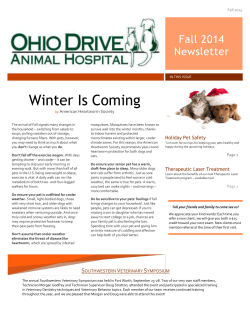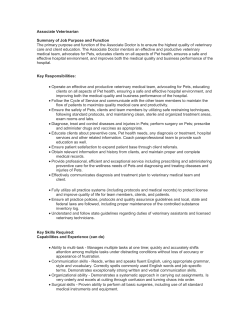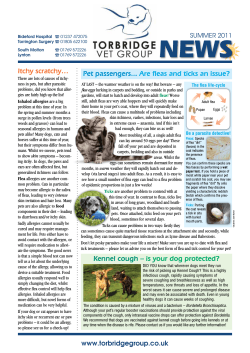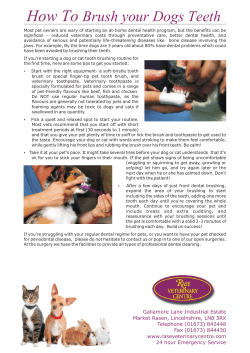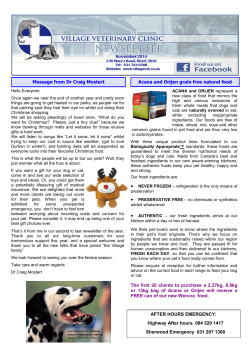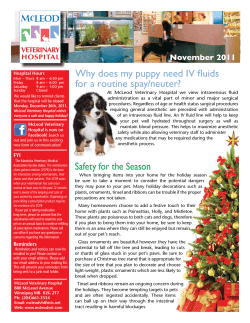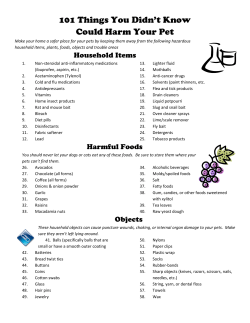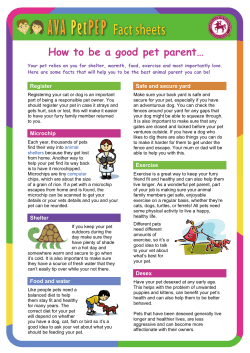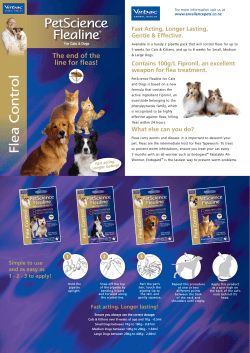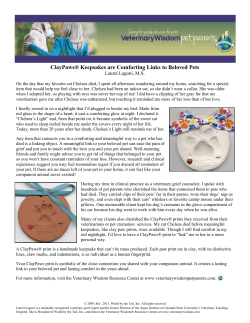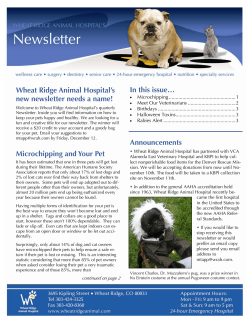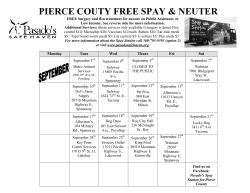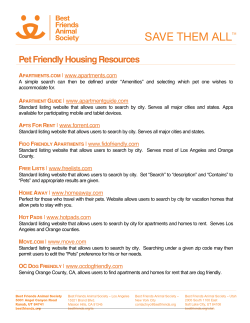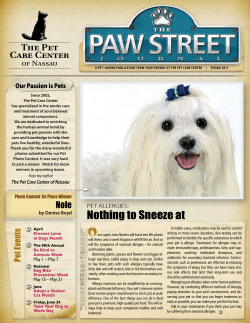
B i l l B o w l... An itchy problem! SUMMER 2008
Bill Bowler Clinical Partner: Bill Bowler B.V.Sc., M.R.C.V.S. Managing Partner: Jeanette Ashley B.A.(Hons). Rushcliffe Veterinary Centre Collington Way, West Bridgford, Nottingham NG2 7LR Telephone: 0115 982 1717 SUMMER 2008 Practice News An itchy problem! GOT an itch? You will have by the time you’ve read this!... As the weather gets warmer, any flea eggs lurking in carpets and bedding, or outside in parks and gardens, will start to hatch – developing (via larval stages) into adult fleas (see the flea life-cycle diagram). Adult fleas are very able hoppers and will quickly make their home in your pet’s coat where they will repeatedly feed on their blood. This can cause a multitude of problems including skin itchiness, rashes, infections, hair loss and even anaemia and weakness. If this isn’t bad enough, they can bite us as well! Worse still, each female flea can lay around 50 eggs per day which drop off pets and fall into carpets, bedding and outside areas. With a life cycle (in warm summer or centrally heated conditions) of around one month, the number of fleas in a household can rapidly reach epidemic proportions! Ticks can cause problems in two ways – firstly by causing a tissue reaction at the attachment site and secondly by transmitting serious blood borne diseases such as Babesiosis and Lyme disease, to name just two! Adult flea Pupae kitten photo: Jane Burton. Our livestock farmers are currently bracing themselves for the potential ravages of Blue Tongue virus infection. This is a viral infection that only affects ruminants (cattle, sheep, goats, llamas and alpacas) NOT pet animals (e.g. dogs, cats and rabbits) or humans. It is transmitted by a type of biting midge. Animals can recover from the infection but up to 60% of sheep and 25% of cattle can die during outbreaks. A vaccine should be available in May for farmers in infected areas. So far there have been a small number of cases in England, but this could change dramatically as the weather warms up. Clients with insured pets may have noticed a change in regime in the insurance claims department. This is because Jayne Kirk is currently on maternity leave after giving birth to James in January. Our congratulations go to Jayne and her husband Ian on their new arrival. Susan Green has bravely volunteered to tackle the growing (and increasingly complex) mountain of insurance work. We still do not charge a fee for processing routine insurance claims (most practices do) to encourage our clients to insure their pets for veterinary fees. Insurance work can be very time consuming so please be prepared, it can take time for the practice to process each claim. Alternatively you can ask for a fast track where we will try to process the claim within 48 hours, there is a charge of £5 for this service. NEWS Eggs Larvae The flea life-cycle Ticks are another parasite to watch out for at this time of year as tick numbers also increase in warmer weather with dogs and cats picking them up in areas of grassland and heathland. Once attached (see photo top right), ticks feed on your pet’s blood, often for several days. So, NOW is a good time to make sure you are up to date with flea and tick treatments! Please let us advise you on the best form of flea and tick control for your pet! And remember, when treating pets for fleas, it is essential to treat ALL the pets in the household and don’t forget the carpets and bedding! Special tenth anniversary to Nottingham by the founder of Animals Asia Foundation, Jill Robinson MBE If you have ever wanted to meet a truly inspirational person here is your chance. In recognition of the fantastic support for Animals Asia Foundation from Bill Bowler’s veterinary practice and other local fundraisers, Jill Robinson MBE will be attending a very special fundraising dinner in Nottingham at the Opium Chinese Restaurant on Monday, 23rd June. In this very important tenth anniversary year for AAF, coinciding with the Beijing Olympics in August, come and hear Jill’s presentation on the progress of AAF’s campaign to rescue more Moon Bears across China and Vietnam from hellish bear bile farms to the safety and freedom in AAF’s sanctuaries in Sichuan province and Vietnam. This year, Jill will be joined by AAF’s China Relations Director, Christie Yang, who will report on AAF’s vital work in promoting animal welfare issues across China particularly addressing the issues of live animal markets and the eating of dogs and cats. Join Jill and the AAF team and find out how you can make a difference to the lives of animals in Asia. Tickets for the dinner event are priced at £25, and are available from AAF on 01579 347148 or info@animalsasia.org or from the practice. Bill Bowler Veterinary Surgery: www.billbowler.co.uk • e-mail info@billbowler.co.uk • Telephone 0115 9821717. You’d be lost without them HAVE YOU ever wondered how you would cope if your pet went missing? Sadly it is all too easy for pets to go missing and the key to finding them is for them to be reliably identified. One solution is the collar and tag and this can work well providing it doesn’t come off – a common problem especially in cats who seem to lose their collars with great frequency. The good news however is that modern technology has come to our aid in the form of a tiny microchip (about the size of a grain of rice) which can be quickly and easily implanted under Microchip implant x1 the skin – permanently identifying your pet. Each microchip contains a unique code that identifies your pet and these details are stored on a central computer database. Microchips can be “read” using a special hand held scanner (see photo). Veterinary practices, the police and animal welfare organisations routinely scan all strays, hopefully ensuring that if your pet does go missing, you will have the reassurance that when found – even if the collar and tag have been lost – the microchip should save the day! Don’t take the risk – make sure your pets are microchipped! Dental disease – Is my pet affected? DID YOU know that pets, unlike their owners, frequently suffer from dental problems without showing any obvious outward signs of pain? Dental disease can occur at any age and recent surveys have shown that as many as 70% of cats and 80% of dogs over three years of age need some form of dental treatment. and to remember that throw- Grass seeds can work their A common problem for pets and way into the feet (see photo ing sticks for dogs can be humans is gum disease. Plaque bottom left), or become hazardous – every year we is the name given to a film of see pets that have potentially trapped in dogs ears’, usually bacteria which is constantly causing severe head shaking. forming on the surface fatal throat injuries from trying to catch sticks. Rabbits, in par- of all teeth. If allowed to accumulate, it will inflame ticular, need to After cats have been out for the gums – a condition LATE, light nights and warm be monitored the day, or dogs have been called gingivitis (see photo above). weather make summer parcarefully for walking through long grass, If left untreated, gingivitis frequently ticularly fun for many pets, but be sure to groom them well fly strike. Rabbit rear ends develops into periodontitis, a painthere are a number of potento try and identify and remove often become damp and ful condition involving destruction tial hazards associated with the any grass seeds and ticks this attracts flies, which lay of bone and tooth supporting strucseason that should be borne in that have found their way eggs, which in turn develop tures and eventual tooth loss. mind – here are a few tips: into flesh eating maggots. into the coat before they Fly strike is very painful and penetrate the skin and Cats may also suffer from one or Visibility in the evenings can frequently results in death. cause problems. more tooth resorptive lesions usufade rapidly, so don’t forget to During the summer months, ally found at or below gum use reflective collars to keep rabbits should be inspected level. Here the tooth is safe. Also, during the day it is daily for fly eggs and maggots. progressively destroyed, important to remember that the (see photo right) leading sun itself can cause damage. Also watch out for bee and Cats with white ear tips and wasp stings that may require to exposure of the nerve running down the centre of the noses are particularly at risk prompt veteritooth. These are generally extremely from sunburn which often nary attenEar tip of a cat showing cancerous changes painful lesions, although cats will leads to localised skin cancer tion since frequently show no obvious outof these areas. This risk can be some dogs ward signs of tooth ache. reduced by applying high factor are allergic waterproof sunblock, applied to their stings. Regular dental examinations (often daily, to reduce sunburn and Finally please remember that in association with a general health the development of skin cancer the temperature in a car can examination) are of great help in (see photo above right). identifying dental disease before rise rapidly and death from it becomes too serious a problem When out on walks it is imheat stroke can follow in Paw of a dog with an interdigital portant to avoid ponds that minutes, so pets should never – please ask us for further informacyst caused by a grass seed tion on dental care for your pet! may contain dangerous algae, be left unattended in cars. This Newsletter is provided as an education service to our clients. All news and other items in this newsletter are for information only and should not be treated as a substitute for specialist veterinary advice. For all images, the copyright is the property of the photographer. If you are planning to put your dog or cat into a kennels/cattery this summer, don’t forget to ensure that all vaccinations are up to date! Cartoon: Gareth Davies Staying cool this summer!
© Copyright 2025


